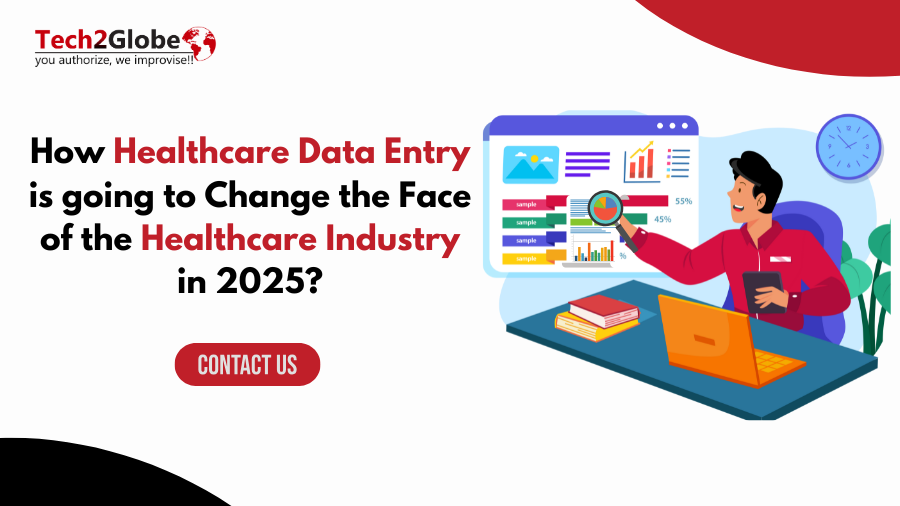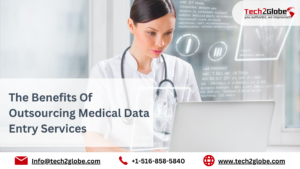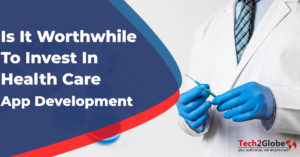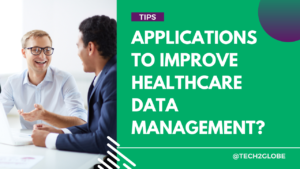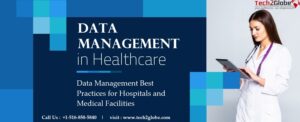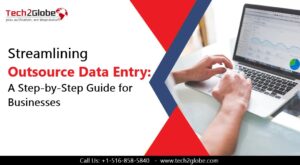The healthcare industry has been one of the most essential sectors in the world for a very long time. Its continuous growth and advancement are clearly evident. Consequently, the change in technology has also transformed healthcare, leading to more efficient and accurate data entry.
How is the current data collection? What will happen in the healthcare industry in the next year? Finding answers to these questions becomes crucial for providers to work and improve patient outcomes. Also, data entry of each patient whose healthcare data is collected accurately is vital for ensuring effective treatment and care.
In the effort to explain the importance of efficiency, we highlight changes in data analytics in healthcare. Moreover, understand how medical data entry services can help to simplify the work with minimum effort, offering health staff time to focus on patient care.
Key Healthcare Statistics from Recent Years
- The global healthcare market is set to grow significantly, reaching $8.96 trillion in 2024.
- India’s healthcare sector has seen rapid growth, now valued at $372 billion.
- Some of the trends include; integrated care systems and personal control through digital solutions.
- Like other innovations, AI continues to transform the healthcare sector as well.
- Lastly, rising costs remain a challenge for quality and accessibility worldwide.
Top Healthcare Data Entry Changes on the Horizon for 2025
Other than providing analytics for actionable insights, healthcare data entry bridges gaps between patients and providers. Additionally, it helps you find the right hospital, estimate costs, and confirm insurance coverage with ease. Read on to understand what else it can do:
Brings Clarity with Effective Solutions
Health analytics is indeed the way forward in the healthcare industry; it now provides real solutions to reduce overhead expenses. Team members can quickly obtain electronic systems to document, store, and monitor patient records. These tools enhance the capacity to analyze diseases simultaneously, thus minimizing errors in ratings and subsequent impacts.
Moreover, wearables and IoT apps enhance people’s abilities in self-managing diseases and communicating with physicians in real-time. Providers can use technologies like image processing and mobile platforms to implement data efficiently.
Healthcare Transparency and Service Planning
With the help of data analytics, the growing amounts of claims data and EHR data can make things more transparent and improve care for a specific medical service. The reason is to cut down on waste, especially regarding time and resources, primarily focused on planning a service. Moreover, health data gives you an exact number for the price of a service compared to how well it works.
Data Analytics for Personalized Medicine
The medical industry is producing and collecting incalculable amounts of data but is facing difficulty with storing and appropriately utilizing it. Thus, it will be easier to analyze these electronic health records with clinical and socioeconomic information. Also, it is useful to apply analytics to study the treatment patterns. Data analysis provides significant help in creating the concepts of the development of personalized medicine.
Analyzing Data Analytics to Identify and Address Health Issues
With healthcare data analytics tools, you can look at the check-up records of patients and public health data to find the problems you want to focus on. It can be based on a country or area, like population growth or age. Additionally, health data can also figure out what makes people not want to get care. This will help in developing a plan to improve care in the areas that are giving you trouble.
Genomics and health data management software.
- Provides genomic services through Next-Generation Sequencing (NGS) and organizes Health Information through Electronic Health Records (EHR).
- Improves clinical research effectiveness using tools supported by vendors.
- Establishing customized programs for diagnosing or treating a disease.
- Building personalized diagnostic or therapeutic strategies.
- Identifying actionable genetic variants for personalized diagnosis or therapy.
Precision Medicine Contributes to an Increase in the Quality of Care.
Precision medicine analyzes data using healthcare data analytics, genetics, and healthcare IT. Much money is spent on research on precise medicine by the government and businesses.
- It has the potential to accelerate scientific discoveries while also providing doctors and clinicians with more tools to further their treatment approaches.
- It takes a fresh approach to considering the patient’s genes, lifestyle, and environment.
- Also, it helps doctors comprehend patients’ complicated health systems and diagnose accurately.
Helps to Improve the Treatment of Computational Medicine
Computer models, analytics, and quantitative methods are used in computational medicine to diagnose and isolate illness causes. A skilled healthcare data analytics assistance provider builds models to solve unanswered medical problems if you have enough clinical data.
- You can understand illness development.
- You can solve medical puzzles with improved data insights.
- Understand how the environment affects patient health.
- Understanding how biological systems go from healthy to harmful.
How Medical Data Entry Services Can Help With Change?
Healthcare groups also require assistance of medical data entry services, as performing the work quickly is often a concern. Technology has advanced all life sectors. It is now possible to observe that most hospitals use digital tools that enhance the speed of the data collection process among patients and doctors.
Understand the benefits of medical data entry services:
Accuracy: One of the perks of medical data entry is that if you do it right, it can make your healthcare documents better and more reliable. Data analyzing is one of the best aspects of these services. If you check your data correctly, you can reduce or eliminate mistakes and inconsistencies in your records.
Enhanced Efficiency: You can expect a significant boost in output if you hire good data entry services. These service providers use modern technology like OCR (optical character recognition), which frees up your workers to work on more critical tasks.
Cost Savings: By hiring someone else to do your data entry, you can save time and money, which you can spend entering data manually. Using efficient data entry services, you don’t have to hire and train new employees (or buy expensive software and hardware).
Data security: Effective data entry services ensure your medical information is kept safe and follows privacy rules. Also, improved security measures like encryption and secure servers, you can rest easy knowing that your private data is safe.
Time-saving: Lastly, these services can help you save time by easing the process of entering data. It lets healthcare workers focus on giving excellent care to patients instead of spending hours typing data by hand.
Conclusion
Every industry changes with each passing year. Similarly, the healthcare industry will witness transformations in 2025. If you think that keeping up with the demands is a challenge in-house, outsourcing healthcare data entry services will give you efficiency and a pathway to results.
As a recognized data entry service provider, we have served numerous clients, which makes us the leader. Therefore, if you want more effective solutions, partner with Tech2Globe. Our team has professional and qualified healthcare data entry specialists to provide accurate service based on your needs. We also ensure the confidentiality of patients’ information through our medical data entry services.
Also Read:
How Tech2Globe Helped a Startup Data Analytics Need with Power BI?
Google Ads in 2025: What to Expect From Paid Search
How to Build a Comprehensive Google Analytics Report for Your Client?
Frequently Asked Questions: FAQs
Q.1. What is the role of data entry in a hospital?
A.1. A data entry job entails gathering data in a health facility, such as patient details and history, and arranging the results. For instance, the information the patient gives by providing their data will be recorded appropriately by the staff for future purposes.
Q.2. What is a dataset in healthcare?
A.2. A data set is a group of related sets of information built up of separate things that a computer can handle. Moreover, a data set can often be just one database table or statistical data grid.
Q.3. Which type of data is most commonly used in healthcare?
A.3. Electronic health records (EHRs) are the most common type of Healthcare data. However, the other healthcare data type may include: Administrative data, Claims data, Patient/disease registries, and Health surveys.
Q.4. What is an example of qualitative data in healthcare?
A.4. Qualitative information in health care: Watching and listening to people in certain places to discover how and why they might feel that way. Questions like “Are you a smoker or not?” or “Do you agree or disagree with this statement?” are examples of qualitative data.

Sarabjeet Singh is the Vice President of Operations at Tech2Globe and brings over 15 years of experience in various industries, including IoT, education, retail, government, FMCG, hospitality, and e-commerce. His leadership focuses on operational excellence and exceeding customer expectations, implementing contemporary solutions. Sarabjeet’s expertise spans e-commerce consulting, software development, data management, BPO/KPO support services, digital marketing, graphics, and startup consulting. He fosters a collaborative work environment, ensuring Tech2Globe delivers high-quality solutions.




